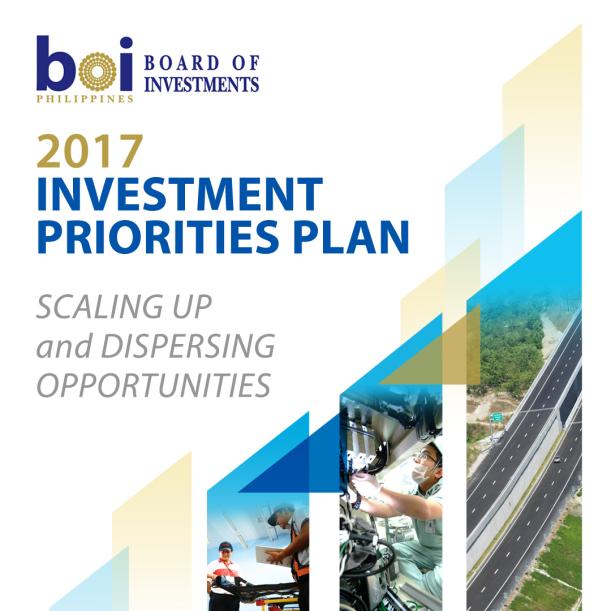The Philippine Government has approved the Investment Priorities Plan for 2017 in a Memorandum Order No. 12 that carries with it the theme “Scaling Up and Disbursing Opportunities”.The Investment Priorities Plan of 2017 hopes to spread the economic development into the countryside and not just limit the economic gains in the Cities of Metro Manila, Cebu, Iloilo and Davao and in the few highly urbanized cities of the Country.
The Government has outlined 10 Preferred Activities for investment which may qualify for incentives.
Preferred Activities:
- All Qualified Manufacturing Activities including Agro-Processing
This covers the manufacture of industrial goods and processing of agricultural and fishery products, including Halal and Kosher food, into (a) semi-finished/intermediate goods for use as inputs in the production of other goods, or (b) finished products or consumer goods for final consumption. This also covers the manufacture of modular housing components and machinery and equipment including parts and components. Except for modernization projects, only projects located outside Metro Manila may qualify for registration.
- Agriculture, Fishery and Forestry
This covers commercial production of agricultural, fishery and forestry products.
This also covers production of seeds and seedling, establishment of nurseries and hatcheries, and support services and infrastructures, such as, facilities for drying, cold chain storage, blast freezing, bulk handling and storage; harvesting, plowing and spraying/dusting; packing houses, trading centers, ice plants in Less Development Areas, AAA slaughterhouse, AAA dressing plant.
Except for modernization projects, only projects located outside Metro Manila may qualify for registration. Modernization projects include those for agricultural support services and infrastructure only.
- Strategic Services
a. IC Design
This covers all logic and circuit design techniques required to design integrated circuits (ICs).
b. Creative Industries/Knowledge-Based Services
This covers IT-BPM services for the domestic market (e.g., contract centers, data analytics), and those that involve original content such as animation, software development, game development, health information management systems, and engineering design. This also covers digital or technological start-ups/activities.
c. Maintenance, Repair, and Overhaul (MRO) of aircraft
This covers the MRO of all types of aircraft.
d. Charging/Refuelling Stations for Alternative Vehicles.
This covers the establishment of charging/refuelling stations for alternative energy vehicles except LPG-run vehicles
e. Industrial Waste Treatment
This covers the establishment of treatment facilities for toxic and hazardous wastes (THW) from industrial operation.
f. Telecommunications
This covers the establishment of connectivity facilities for fixed and mobile broadband services.Only new players may qualify for registration.
g. State-of-the-art Engineering, Procurement, and Construction
This covers engineering design, procurement, and construction for industrial plants and infrastructure.
- Healthcare Services including Drug Rehabilitation Centers
This covers the establishment and operation of general and specialty hospitals, and other medical/healthcare facilities including drug rehabilitation centers.
- Mass Housing
This covers the development of mass housing units based on a price ceiling of P2.0 Million.
This also covers in-city low-cost housing projects for lease.
Except for in-city low-cost housing for lease, only projects located outside Metro Manila may qualify for registration.
- Infrastructure and Logistics including LGU-PPPs
This covers the establishment and operation of physical infrastructures vital to the country’s economic development and prosperity such as, but not limited to: airports, seaports, (air, land and water) transport, LNG storage and regasification facilities, pipeline projects for oil and gas, bulk water treatment and supply, training facilities, testing laboratories, and domestic industrial zones. This also covers PPP projects including those initiated and/or implemented by Local Government Units (LGUs).
- Innovation Drivers
This covers research and development (R&D) activities, conduct of clinical trials, (including drug trials) and the establishment of Centers of Excellence, innovations centers, business incubation hubs, and fabrication laboratories (fablabs)/co-working spaces.
This also covers commercialization of new and emerging technologies and products of DOST or government-funded R&D, such as, but not limited to:
- Agricultural biotechnology tools
- Disaster mitigation/prevention hardware or software
- Hardware or software for increasing agricultural productivity
- Mechanized means for natural resources conservation
- Portable technologies – innovation on existing bulky or heavy device to make it portable, or a new device or service that can be brought virtually anywhere.
- Hardware or software for prevention of disease outbreaks
- Remote monitoring devices or systems
- Professional services for remote sensing
- Hardware or software for upgrading of local industries
- Photonics and Nanotechnology
- Natural health products
- Inclusive Business (IB) Models
This covers business activities of medium and large enterprises (MLEs) in the agribusiness and tourism sectors that provide business opportunities to micro and small enterprises (MSEs) as part of their value chains.
IB projects may qualify for Pioneer status.
- Environment or Climate Change-Related Projects
This covers manufacture/assembly of goods and the establishment of energy efficiency-related facilities where either utilization of which would significantly lead to either the efficient use of energy, natural resources or raw materials; minimize/prevent pollution, or reduce greenhouse gas emissions.
- Energy
This covers power generation projects utilizing conventional fuels (i.e., coal, diesel, bunker, natural gas, and geothermal), waste heat and other wastes, and the establishment of battery energy storage systems.
By Roel R. BADURIA, Orbis Philipines partner.

 Français
Français
 English
English  Español
Español 